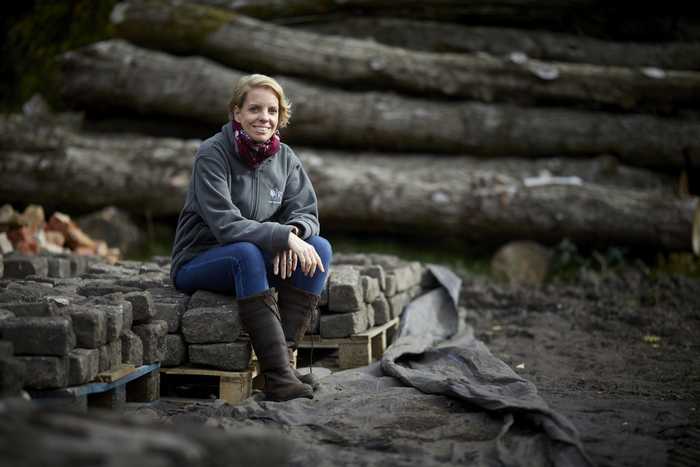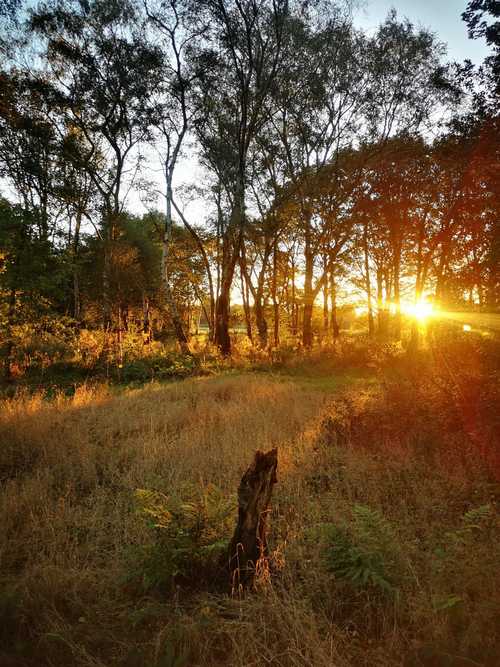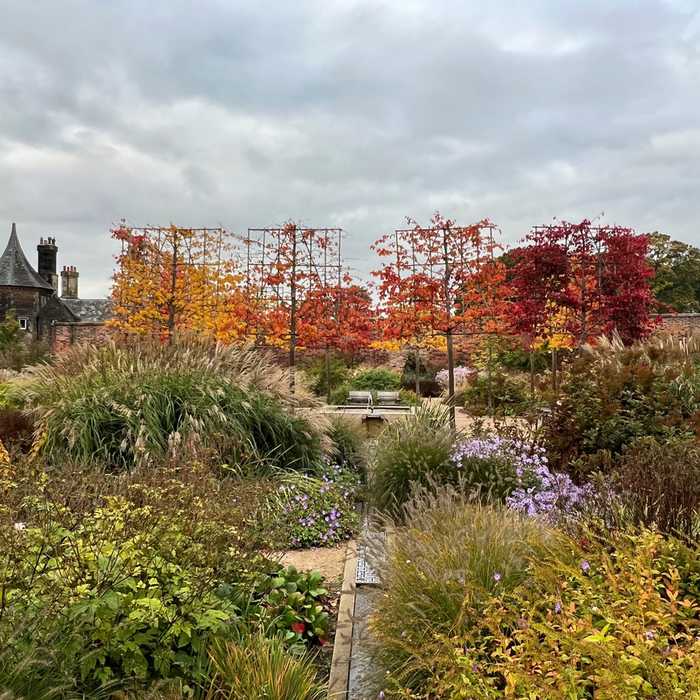Have a seat with...
Tracy Snell
In today’s Have a Seat With, we chat with Tracy Snell, Garden Manager at RHS Garden Bridgewater.
RHS Garden Bridgewater in Salford is the Royal Horticultural Society's fifth public display garden and the single biggest gardening project undertaken in Europe.
We fork over plenty of ground with Tracy; from the many challenges of transforming the New Hall Wolsey estate in Salford, to the Queen’s jubilee visit to RHS Bridgewater earlier in the year. It’s an inspiring read…

Hello, Tracy! Thanks for chatting with us today. Could you tell us what a typical working day looks like for you...or is every day entirely different?
You are quite right, every day is different. Some days will be in the office sorting out paperwork or meetings, others outside with the team doing anything from weeding to setting out and planting new borders or chatting to the public and taking them on tours. I find this keeps things interesting and me on my toes. I've been very fortunate in my time here, from getting to enjoy Chelsea Flower Show when it's all calm, just before the gates open, to visiting amazing gardens in China as part of research for our own Chinese Streamside Garden.
RHS Bridgewater is the largest gardening project undertaken in Europe; a venture that completely transformed the historic 154-acre Worsley New Hall estate in Salford. Could you tell me how you became involved in the project as garden manager, and what impact it's had on the local community and environment.
A big question! I got involved as I was working locally as a landscape architect and was keen for a change in direction. The job advert came up, which my husband saw and encouraged me to go for. It is a once-in-a-lifetime opportunity to be a part of something like this; a big change in my career, but I love the balance of design, planning and then getting my hands dirty helping to turn designs into reality.
For me, this job feels a bit like I'm walking in the footsteps of the landscape architects who originally shaped the site in Victorian times. To be part of a team designing and delivering a brand new garden is quite something.
In terms of what we are doing for the local community: on Tuesdays, Salford residents can come to the garden for free. We have welcomed over 7,400 school children on free visits and workshops in our first year, as well as working closely with local community groups who can take on a plot in our community grow area for a year and garden alongside some of our staff. In addition, we have our wellbeing programme which runs weekly for local recognised groups and organisations to benefit from, again for free.
For the environment, we have removed invasive species and started the process of rebuilding habitats. As a result, our wildlife is blossoming; we have a more diverse range of birds (and it was pretty good to start with!) as well as bigger numbers; an increase in bats, an increasing range of invertebrates and we are increasing our amphibian populations, too.

What were some of the main challenges you faced before opening the gardens in May 2021?
The first challenge was taming the wilderness, nature had taken over the site, and we had a woodland full of rhododendron ponticum and huge swathes of Japanese knotweed. We employed specialist contractors initially to treat the knotweed and then trained staff to continue the process. We’ve almost eradicated it all now! We’ve also had to regulate the swathes of Himalayan balsam across the site.
Meanwhile, the team alongside our volunteers have spent a year solidly clearing rhododendron throughout the woodland and other dense vegetation in the walled garden before the contractors came in.
The weather has to be one of the biggest factors. We have an average of one meter of rain per year on site. Teams dug trenches for new beech hedging that constantly filled with water; we had large areas inaccessible due to standing water and flooding. When constructing our stream in the Chinese Streamside Garden, we limited the contractor to one construction route to ensure that we limited damage to trees in our woodland. That route and area became inaccessible to anything but large machinery. It became so wet, that we renamed the garden the Chinese Swampside Garden! Hard to imagine now.
We could not mention challenges without talking about COVID. When the pandemic first hit, all staff members who didn't need to be on site started working from home; those teams that needed to be on site were split in half and worked 5-days-on/5-days-off shifts, and each team didn't see the others for 2 months.
To continue planting, and keep existing plant life alive, we needed a constant presence on site. It was a strange time; we sent all our contractors away except BAM who were a self-contained welcome building. We also delayed our opening by 10 months; suddenly the pressure was off and for all staff it gave us a chance to go somewhere other than our own 4 walls at home. It was actually a very peaceful time on site.
In an age where sustainability and ecological responsibility are such important issues, what do you think will be the legacy of RHS Bridgewater?
We are custodians of a landscape. Through our work redeveloping the site, we are rebuilding habitats, albeit not sticking to just native plants, and providing space for the wildlife we have on site.
Our legacy is demonstrating to our visitors the beauty of different styles of gardening and how each can be beneficial to wildlife. Gardens are hugely important to wildlife, often providing the link and stepping stones between habitats or a home in their own right. We also have the chance to help people understand sustainable choice when they are gardening and provide inspiration for them to garden in their own backyards.
"For me, this job feels a bit like I'm walking in the footsteps of the landscape architects who originally shaped the site in Victorian times. To be part of a team designing and delivering a brand new garden is quite something."
To celebrate the Queen's Platinum Jubilee, RHS Bridgewater planted 70 trees in the Victoria Meadow. How did you feel to be involved in such a historic occasion, and what will be the long-term benefits of the project?
It's an honour to be part of a project like this to mark the Queen's Platinum Jubilee. It is great to have the space to plant 70 trees and know we can nurture them to maturity for the benefit of wildlife and climate change. We planted native trees and cultivars of native trees. These are in three copses, as well as specimen trees to provide a framework for the wildflower meadow beneath that we are gradually restoring from a former agricultural field with little diversity. The long-term benefits will be for wildlife, introducing copses and trees into the meadow creating edges (termed ecotones) which are the space between two types of habitat and these are often the most biodiverse.
How do you think people's attitudes have changed in the last few years towards both the RHS and gardening in general. Do you think it's become a more accessible pastime, particularly for younger generations?
The pandemic has opened up gardening to so many more people and so many understand the benefits of it where previously they may not have had the time or inclination. The change is seen at our shows where we now have categories dedicated to container gardening, house plants and balconies. I'm not sure that gardening has become more accessible to people, it is just that more people have decided to give it a go and realised how much joy can be had from growing your own food, seeing a seed you've planted germinate and the wildlife that can be drawn to a garden just from a simple window box.

"More people have decided to give gardening a go and realised how much joy can be had from growing your own food, seeing a seed you've planted germinate and the wildlife that can be drawn to a garden just from a simple window box."
Right, we must ask...are our swing seats still proving to be popular features at RHS Bridgewater? And how are people enjoying the new swing seat that was installed in July?
Our visitors love the swing seats. From the moment we open the doors, to the end of the day, there are people sitting on them, enjoying the views and just taking a moment to relax. You often see people hovering, waiting for the swing seat to become free. Our next seat is already hugely popular and a draw for people.
With such a busy working life at the RHS, what do you like to do in your downtime?
Well, I don't really have much down time. We moved house during the second national lockdown. The house needed some work and we’ve spent most of the time in the garden, replanning and repurposing the space. The bones of the garden are good, but it has become overgrown over the years with lots of massive trees and shrubs. We started clearing a space for our compost bins in an area totally covered in shrubs. We didn't stop and now have a new vegetable garden and shed. I also have two young boys, so weekends are often spent running them to different clubs.
What's next on the horizon for you, Tracy?
Continued development of the gardens. We are looking to develop the Chinese Garden further over the next few years, adding structures to give a distinctly Chinese feel to the space. We are also looking to start developing proposals for an arboretum, and longer-term, we’re looking at expanding the terraces. There are so many ongoing projects, and I'm excited to be part of the team here at RHS Bridgewater to help see them to fruition.
Thank you, Tracy, it's been a pleasure.
Photo credits: Header image: RHS/Mark Waugh, second image: RHS/Greg Douglas-Thorne and the third image: RHS/Jonathan Barker
Discover more...
The Sitting Spiritually 'Have a Seat With' series takes a look behind the scenes at how we switch off from the bustling modern-day lifestyle. We speak to people of all sorts of backgrounds and lifestyles around the country as we seek to explore the different ways of relaxing and just taking a moment.
Posted on November 17th 2022
